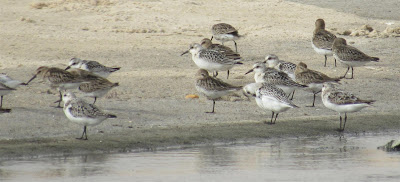It is also in an embassy area and discrete birding is recommended or else the authorities will take an interest in you.
I tend not to linger in the area but try to pick out anything unusual quickly.
Sadly as a result of landscaping it is more saline than in the past and reed beds have died. Nevertheless it still has diversity.
pied avocet (right)
The water level is very attractive to black-winged stilt and this time there were over 30 present. A much less common bird was a pied avocet which is a related bird.
mostly black-winged stilt
northern shoveller (behind)
Mediterranean gull
There were five black-headed gull present. However there was also an exception among the gulls. It was a Mediterranean gull.
little stint
No rare waders were observed though one little stint was still not approaching winter plumage and it stood out from the others.
spur-winged lapwing
ruff
There is a dried out section next to the main water body which held some interest. Ruff were easier to see than the long distance swimmers on the lake.
common redshank
A small number of common redshank were in the same area.
dunlin
Most dunlin seen in Nouakchott at this time of year are the short billed sub-species arctica. However a few have longer bills. The one above has a bill long enough to be alpina. Though they aren't supposed to winter as far south as West Africa. Only this sub-species gives me difficulty in separation from the similar curlew sandpiper.
curlew sandpiper
Two obvious curlew sandpiper were seen a few metres away.
blue-cheeked bee-eater
Blue-cheeked bee-eater don't need water but there always seems to be a higher concentration of them near water in Nouakchott while they are here (July-December).
Just over half an hour's further walk west, provided one isn't distracted by birds, is the fishing port.
I bird watch just south of it as it is quieter than the port itself and has a couple of good birding spots.
mostly Audouin's gull
Audouin's gull have arrived in umbers.
A few lesser black-backed gull have arrived too though a few less healthy ones stay all summer.
lesser black-backed gull (left)
I will admit, I don't get the greatest enjoyment out of gulls. However, over the past year, I have taken pleasure at seeing both Franklin's gull and kelp gull here. Given my lack of general enthusiasm, I find it difficult to understand why people go to so much effort to ring gulls.
first year Audouin's gull
Noteably, a significant proportion of Audouin's gull that I see here are ringed. Surely we now know many of them winter in southern Mauritania. I wish more attention was paid to ringing birds like Iberian chiffchaff which nobody really knows where it goes.
Iberian chiffchaff is supposed to pass through here and then to winter in Senegal and Western Mali. Ringing them in siginifcant numbers would help me separate them from willow warbler too.
another ringed Audouin's gull
Down at the man-made lagoon by the beach, there was some interesting activity. However constant walk-bys of the fishermen made birding tough.
little tern
As always, I look for the single birds. I saw my first little tern since returning from my summer break.
dunlin and sanderling
Dunlin and sanderling were far from singles. Large numbers are here at present.
Given the disturbance at the lagoons and my lack of time before sunset I chose to move on to the rubbish dump. This is where poor quality fish are discarded. It smells really bad but always has a good variety of birds.
black tern
This time I was rewarded with excellent and prolonged views of a flock of around 18 black tern. They were so busy eating flies over the dump or resting that they virtually ignored me.
whimbrel and common sandpiper
Other birds around the dump included the expected yellow wagtail and common sandpiper. However whimbrel was more surprising.
ruddy turnstone
black tern (l) and dunlin (r)
As at the lagoon, there was another mixed flcok of sanderling and dunlin. It was worth holding my nose at the dump for the close views of all these species.
Central Lake on Friday 17th September
Northern Shoveller
Black-winged Stilt
Pied Avocet
Spur-winged Lapwing
Kentish Plover
Common Ringed Plover
Black-tailed Godwit
Ruff
Dunlin
Little Stint
Common Greenshank
Marsh Sandpiper
Wood Sandpiper
Common Redshank
Black-headed Gull
Mediterranean Gull
Laughing Dove
Blue-cheeked Bee-eater
House Sparrow
South of fish market on Friday 15th September
Cattle Egret (Western)
Common Ringed Plover
Whimbrel
Ruddy Turnstone
Curlew Sandpiper
Sanderling
Dunlin
Little Stint
Audouin's Gull
Yellow-legged Gull
Lesser Black-backed Gull
Little Tern
Caspian Tern
Black Tern
Royal Tern
Laughing Dove
Blue-cheeked Bee-eater
Southern Grey Shrike
Crested Lark
Willow Warbler
Cricket Longtail
Common Redstart
Western Yellow Wagtail
House Sparrow






















No comments:
Post a Comment